Want to learn about the health benefits of elderflowers, how to harvest elderflowers and how to make elderflower tea as well as use elderflowers in remedies? Continue reading and find out.
The elderflower (Sambucus nigra) is one of the most popular flowering shrubs in Eastern and Central Europe, North America, and other parts of the world. The white elderflowers, with their sweet-pungent aroma, and the elderflower cordial made from them is certainly one of our childhood’s delights. Elderflowers are, however, much more than food, they have very strong medicinal properties. Before we get to the health benefits of elderflowers, I want to show you how to harvest elderflowers and preserve them for medicine, and then I will show you how to use elderflowers in various medicinal preparations. Let’s get to it.

In This Article You Will Find:
How to Harvest Elderflowers
Elderflowers are harvested with gratitude shortly after flowering (when half of them are open) and in woven baskets or cloth bags, in sunny, dry weather. Immediately lay them to dry in the sun. Similar to black locust flowers, elderflowers are also dried in the sun and not in the shade, as with most medicinal plants. Spread the elderflower bouquets on paper in a sunny and well-ventilated place, away from humidity or rain, as moisture will destroy their active principles.

Leave them to sundry for 3-7 days (depending on how strong the sun is). When the flower stalks are completely free of moisture (have lost their elasticity) the drying process is over, and the elderflowers can be stored in tightly-sealed paper bags. How that you know how to harvest elderflowers and how to preserve them, here are a few medicinal elderflower recipes that you can make and use in the natural remedies with elderflowers below.
In folk medicine and especially in magic medicine, it is believed that elderflowers are healing only when picked by a humble and kind-hearted man. Otherwise, they get an unpleasant odor, change color to a dark brown, and can do more harm than good.
9 Ways to Make Elderflower Medicine with Exact Recipes
1. How to Make Elderflower Infusion
Put a teaspoon of elderflowers in a cup of boiling water, then cover and steep for 10-15 minutes. Strain, sweeten with honey to taste and drink the elderflower tea as hot as possible. While the therapeutic effects of elderflowers are greatly diminished following the hot infusion, due to the thermal effect, the antispasmodic, bronchodilator, and sweating actions are actually amplified, making this infusion a great medicine for bronchitis, sinusitis, cold, and flu, as these are the main health benefits of elderflowers.
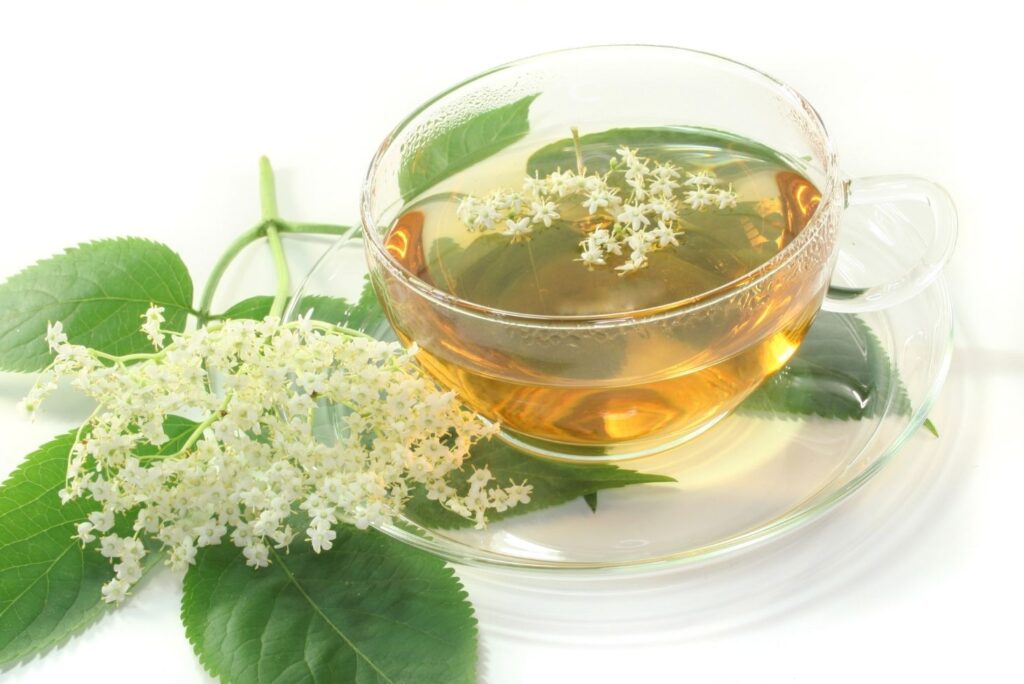
2. How to Make Combined Elderflowers Infusion
However, in most cases, the combined elderflower infusion is preferred instead of the elderflower infusion, as it has a much wider therapeutic effect. To prepare it, put 3-4 tablespoons of the dried elderflowers to soak in half a liter of room temperature water for 8-10 hours, then strain. The cold macerate is set aside, and the leftover elderflowers are boiled in another half liter of water for five minutes. Allow to cool down and strain. Finally, mix the two extracts together. You will obtain approximately one liter of combined infusion, which can be used internally or externally, in the form of compresses and baths, as you will see below.

3. Elderflower Powder
It is obtained by grinding the dried elderflowers as finely as possible using an electric coffee grinder. Store the powder in a sealed glass jar, in a dark and cold place, for a maximum period of 2 weeks (because the volatile substances evaporate quickly). Elderflower powder is usually taken on an empty stomach, but you can find directions in the remedies below.
4. How to Make Elderflower Tincture
To make the elderflower tincture, put 15 tablespoons of elderflower powder in a jar and pour 2 cups (400 ml) of 50-degree food alcohol (vodka, rakija) over. Seal the jar and leave to soak for two weeks, then strain. Pour the elderflower tincture into small, amber bottles with a dropper.
5. How to Make Elderflower Cordial
To make the healing elderflower cordial, add 6-12 large inflorescences separated from their stems to 4,5 liter of water (10 gallons), then add 600-800 g of raw honey and one whole organic lemon, finely sliced. Cover the jar with cling foil or a small plate and leave to soak in the sun for 5-7 days (no more than this, otherwise the cordial turns into an alcoholic beverage), while stirring daily with a wooden spoon. Strain and pour into sealed amber glass bottles and keep them in the fridge.
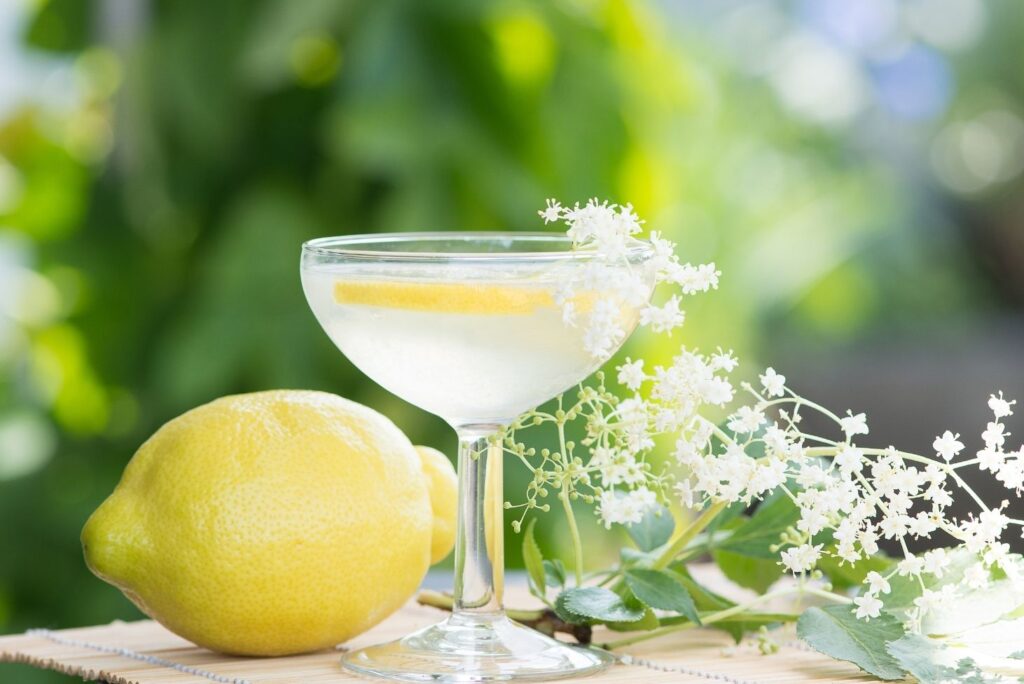
To enjoy its medicinal properties, elderflower cordial is usually drunk before a meal. Elderflower cordial is amazing for asthenia, overwork, depression caused by stress, and repression of emotions as well as mental and emotional blockages when accompanied by a predominantly vegetarian diet and healthy eating. In folk medicine, elderflower cordial was used not only for its effects of unleashing erotic energy (which is a secondary component) but also for overcoming other blockages, such as fear of relating to others, lack of communication, etc as this is one of the key health benefits of elderflowers.
6. How to Make Elderflower Syrup
To make the elderflower syrup cut the stems from 20 fresh elderflowers, then pass them through the juicer to mash them and extract the juices. Put a finger-thick layer of honey in a jar, then add a thin layer of mashed elderflowers with the juice, then again a finger-thick layer of honey, another layer of chopped elderflowers, and so on, until you fill the jar. The last layer will be honey, slightly thicker than the other layers (2-3 fingers). Leave the syrup in a cold spot (in the pantry or in the cellar) for at least two months, then strain the honey through a piece of gauze and the elderflower syrup is ready.
You can leave it as is, unstrained, and use it as a medicinal elderflowers jelly. The shelf life of the elderflower syrup is 2 years. To use it, put 1-2 teaspoons of syrup in a cup of water (200 ml), add a little lemon juice, and mix well. Drink 1-3 glasses of syrup a day on an empty stomach to enjoy its medicinal properties.
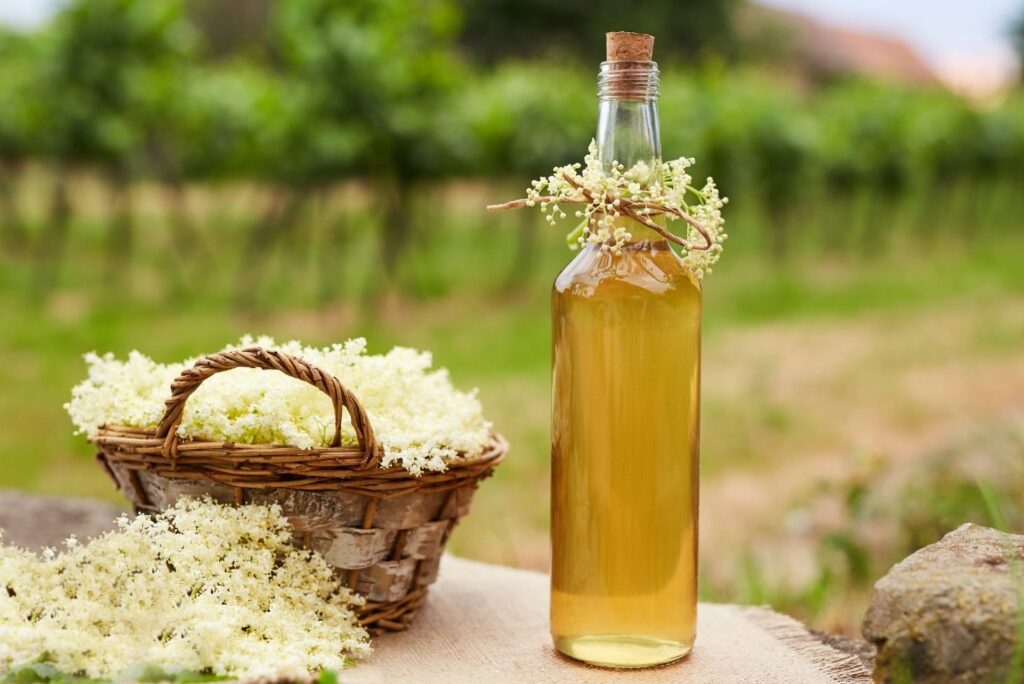
Elderflower syrup and jelly are indicated as an adjunct in the treatment of colds, flu, and viruses in general. Two-three weeks of treatments with elderflower syrup help fight rhinitis, chronic rhinitis, urinary tract infections and relieve kidney infections. Due to their laxative and purifying effect, they are indicated for the treatment of acne and other skin diseases, as this is one of the less-known health benefits of elderflowers.
7. How to Make Elderflower Salve
For this healing recipe, you need 5-10 fresh whole elderflowers, 250 ml cold-pressed olive oil, and 40-50 g beeswax. Heat the flowers and oil in a pot until you see bubbles forming. Remove from the heat, allow to cool, and keep cool overnight. The next day they heat it up again and leave again for 12-24 hours. Strain the elderflowers through a thick cloth. Heat up the infused oil slightly, add the beeswax and let it melt over low heat, stirring constantly. Pour the hot elderflower salve into cream containers (glass or porcelain), close with a lid, and keep in the dark and cool.
The shelf life of the elderflower salve is 1 year. You can use this salve to soften rough hand skin, heal chapped lips, and heal wounds quickly. If you add 10 drops of seabuckthorn oil and 10 drops of essential lavender oil, you can also use this salve as natural sunscreen or to alleviate mild sunburns. This is one of the least known health benefits of elderflowers.
8. How to Make Elderflower Oil
Put 15 tablespoons of elderflower powder in a threaded jar and pour over half a liter of cold-pressed sunflower or olive oil. Close the airtight jar, let the flowers soak for two weeks, then strain the oil and pour the infused oil into an amber bottle. The elderflower oil is usually used in massages for dry skin, half an hour after bathing. Elderflower oil is also used in aging skin and sunburn.
9. How to Make Elderflower Cataplasm
Soak a handful of chopped elderflowers in warm water for 40 hours (40-50°C / 104-122°F). Apply directly to the affected area, covering it with gauze. Leave for an hour. One of the main health benefits of elderflowers’ cataplasm is in alleviating frostbite or rheumatic fever.
The Health Benefits of Elderflowers

There are very few natural remedies for lung, rheumatic, or kidney conditions that are as effective as elderflowers. They have excellent anti-inflammatory properties in upper respiratory tract inflammations, as well as powerful antiviral effects, by increasing and fluidizing and expectorating bronchial secretion and inducing sweating, which leads to a considerable reduction in the time of manifestation of common colds and flu.
Another one of the health benefits of elderflowers is their laxative and diuretic properties, with great results in constipation and kidney problems. They also help eliminate urea from the body, being a valuable aid in case of gout. Even more, elderflowers have the power to activate peripheral circulation, with beneficial effects on varicose veins, phlebitis, hemorrhoids, capillary fragility, capillaries, or dilated veins.
Elderflowers also have anti-inflammatory effects on joint pain and can be used to prevent rheumatic fever and sciatica pain. The reason is that they have cleansing, anti-inflammatory effects on the joints and help fight degenerative processes. One of the key health benefits of elderflowers is their immune-boosting properties when used as infusion or tincture. Here are the main health benefits of elderflowers:
- viral lung infections
- bronchitis, sinusitis
- cold and flu
- boost immunity
- UTIs
- kidney problems
- rheumatic fever
- constipation
- water retention
- acne
- cellulite
- depression, stress, overwork
- addiction
Now that you know what are the most important health benefits of elderflowers, here are the most popular natural remedies with elderflowers that you can safely follow at home.
10 Natural Remedies with Elderflower & How to Use
1. Sinusitis & Rhinitis
One of the main health benefits of elderflowers is viral infections, namely in acute cases of sinusitis and rhinitis. For this, 3 cups of elderflower infusion a day is an amazing remedy, due to its strong draining effect. In chronic sinusitis and rhinitis, the combined elderflowers infusion works even better. In this case, you can drink one liter of combined infusion per day. The best results are obtained by combining when making the infusion, equal parts of elderflowers and cowslip root (Primula officinalis). Elderflower and cowslip root remedies promote drainage of the sinuses, decongest the nasal passages and reduce inflammation of the mucous membranes. This is one of the most powerful elderflower medicines that you can make at home.
2. Bronchitis
For bronchitis, elderflower powder is the most potent way to use this medicine (one teaspoon 4 times a day). The effects are amplified if taken together with cowslip root (Primula officinalis) and burdock root (Arctium lappa) in the form of powders, or teas. This is one of the main health benefits of elderflowers. You can also use elderflower infusion (2 cups/day after meals) or tincture (30 drops, twice a day, mixed in linden tea).

3. Cold & Flu
Elderflowers are successfully used in cases of colds and flu with a runny nose, bronchial symptoms, and sore throats. You can drink 2-3 cups of elderflowers infusion on the first day of the cold. On the second day continue the treatment by consuming a liter of combined infusion of elderflowers every 24 hours, until the cold and flu symptoms are relieved. Indeed, this is one of the most simple yet most effective health benefits of elderflowers. For fever, the hot elderflower infusion is recommended, half a cup at a time, 2-3 times a day.
4. Headaches
Headaches, especially those caused by a cold, exposure to cold and wind, or preexisting respiratory infections (sinusitis, rhinitis) are relieved and even stopped with elderflower infusion. You can drink 1-2 cups of elderflower infusion sweetened with raw honey, and drink as hot as you can. For chronic headaches, drink the combined infusion of elderflowers, 2 cups a day. Simple and effective elderflower medicine.

5. Rheumatism
Elderflowers, when used at the first signs of joint pain, have an excellent effect in preventing rheumatic fever. To relieve these painful symptoms, the best elderflower medicine is the elderflower tincture, one teaspoon 4 times a day over the course of 2 months. Taking elderflower tincture during rheumatic fever reduces the pain, gradually restores the mobility of the joints, and prevents the irreversible damage of the fine cartilaginous tissues inside the joints. This is one of the most important health benefits of elderflowers. Elderflower tincture is also great for sciatica (1/2 tsp, three times a day with water or tea).
If you prefer drinking tea, have one liter of combined elderflower infusion a day for a period of 3 weeks. You can also make cataplasms with freshly picked elderflowers. Soak a handful of crushed elderflowers in warm water (40-50°C) for 1-2 hours. Apply the cataplasm directly to the sore areas, wrap with a piece of cling foil, and cover everything with a thick fabric material, preferably wool. Leave it on for an hour, then remove and wash the area with lukewarm water.
6. Water Retention
Elderflowers have strong diuretic and sweating effects, stimulating massive elimination of water retention from the body through urine and perspiration. People who have trouble with water retention in their tissues, waking up in the morning with swollen hands and feet, can use elderflower as follows. Drink a cup of combined elderflower infusion, one in the morning and the other one in the evening. This simple elderflower medicine is also recommended for the prevention of kidney stones, nephritis, and kidney failure as these are some of the key health benefits of elderflowers.
7. UTIs
Elderflower cordial is recommended against constipation, water retention in tissues, and for people who frequently have urinary or kidney infections. In cystitis and nephritis, elderflower cordial promotes the regeneration of epithelial tissue, reducing pain and stinging. Elderflower cordial is especially recommended for adults who need additional stimulation of digestion and elimination processes, as well as a general tonic. To enjoy its medicinal properties, have three glasses (30-75 ml) a day, a quarter of an hour before a meal. People who frequently experience conditions such as nephritis, pyelonephritis, or cystitis can follow a 1-2 week cure every three months with elderflower cordial. Elderflower infusion and tincture are also recommended for kidney failure and hypertension.
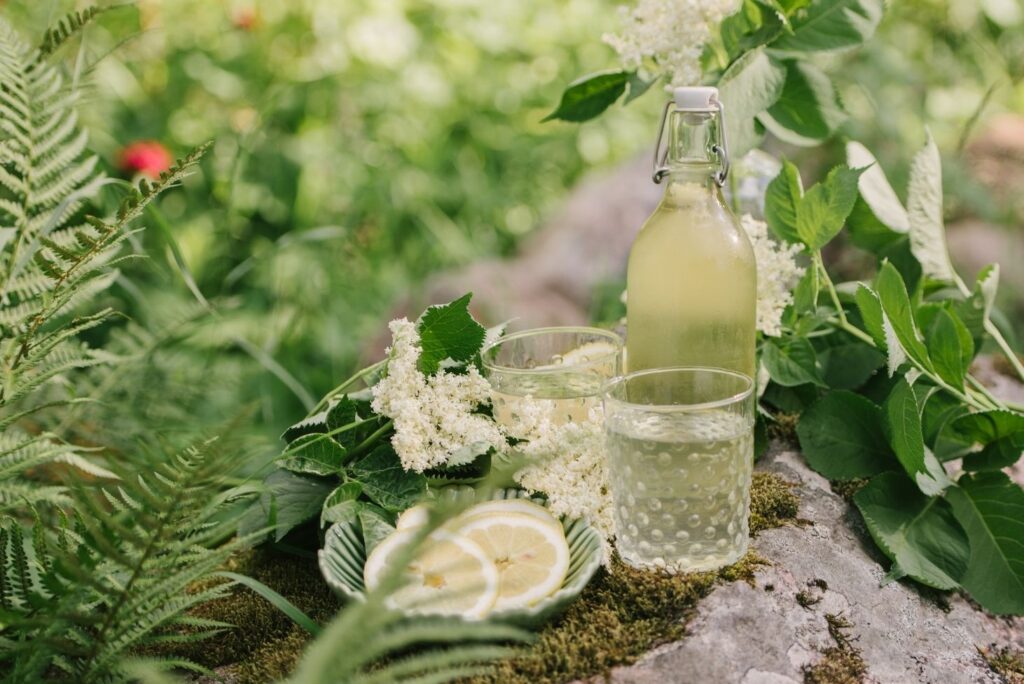
8. Addiction
Research shows the ability of the active ingredients in elderflowers to fight physical (not mental) addiction to certain synthetic drugs (cannabis, hashish, ecstasy) or sedatives. The combined elderflower infusion is the most powerful medicine in this case. You can have one cup, three times a day. Continue for 4-6 weeks, pause for 3 weeks and then resume if needed. The combined elderflower infusion balances the nervous system, simultaneously exerting a stimulating and calming action.
9. Constipation
Elderflowers stimulate digestive peristalsis in general and intestinal in particular, being especially helpful for sedentary people with digestive problems, and having special effectiveness in combating digestive atony. To relieve constipation, drink a cup of hot elderflower infusion in the evening, before bed, as it has a laxative, diuretic, and sweating effect. You can also have 1 tsp of elderflowers powder 10 minutes before meals.
10. High Cholesterol
Unlike other remedies, elderflowers do not lower cholesterol levels, but largely prevent its oxidation in the body, a process that leads to the building of cholesterol deposits on the arteries, and serious heart and vascular conditions. To help balance cholesterol levels, 2-3 cups of combined elderflower infusion a day, over the course of 4 weeks can greatly help. Pause for 2 weeks and resume if needed. This is one of the less-known health benefits of elderflowers.

Elderflowers Side Effects & Safety
Excepting the cases in which you are allergic to elderflowers, there are no known contraindications or side effects to using elderflowers (Sambucus nigra) in the recommended doses. Using elderflower while taking laxatives and synthetic diuretics needs to be done under medical supervision. Mild allergic reactions can include symptoms such as skin irritation, difficulty breathing, runny nose or eyes. If you have gastric sensitivities and you experience symptoms such as diarrhea, abdominal cramps, and nausea when using elderflowers, please consult a medical doctor.
Children under 12 years of age should use 2-4 times reduced dosages compared to adults. Stop using elderflower remedies if one of the above-mentioned symptoms occurs. Elderflowers infusion can be consumed during pregnancy and breastfeeding.
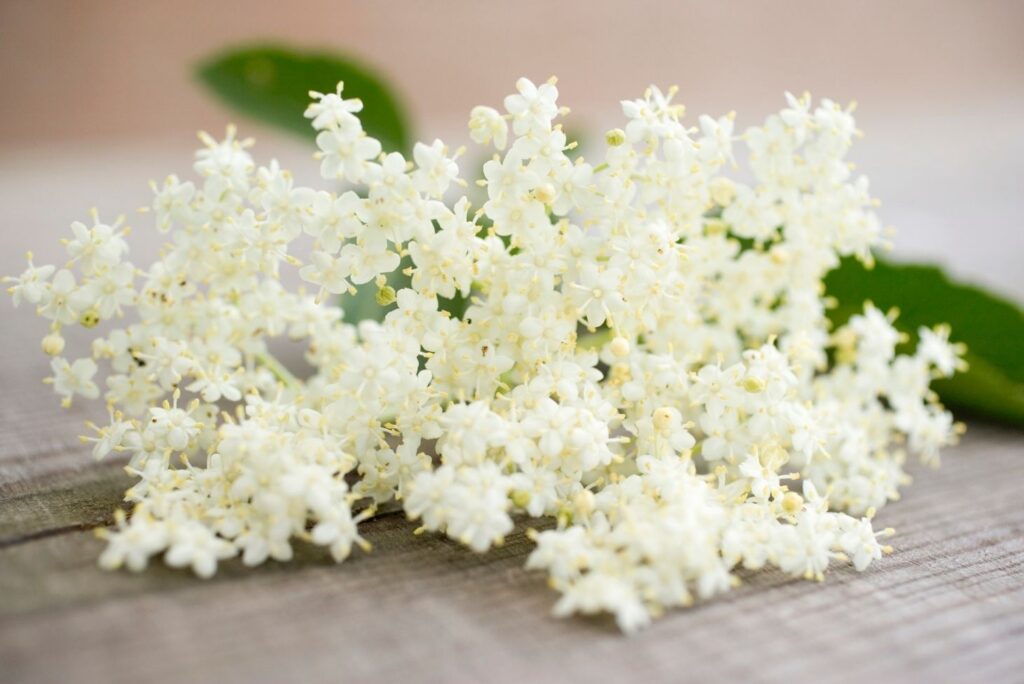
How to Use Elderflowers for Soul Aches
Elder is recognized, both in Romanian and European folklore, as a medicinal plant, but also a magical herb. In the villages of northern Moldova and Transylvania, it was said that the elder is protected by the “iele” or by wind spirits. Therefore, it is seldom struck by lightning, grows on all grounds, and is not attacked by caterpillars or other spoilers. It was also believed that touching its branches is beneficial for the sick, but you should not sleep under the elder, especially if it is in bloom, because the “wind spirits” can make you sick, and angry that you have violated their territory.
In medieval England and Scandinavia, it was considered a great mistake to cut an elder, especially if it was old because spirits of nature would dwell in its branches, and take terrible revenge on the perpetrator. It was believed that an elder bush has the power to provide protection to the houses near which it grows, respectively, to the people who live in them, because of the supernatural entities, elves, fairies, and spirits, living between its branches, usually in transit to the afterlife.
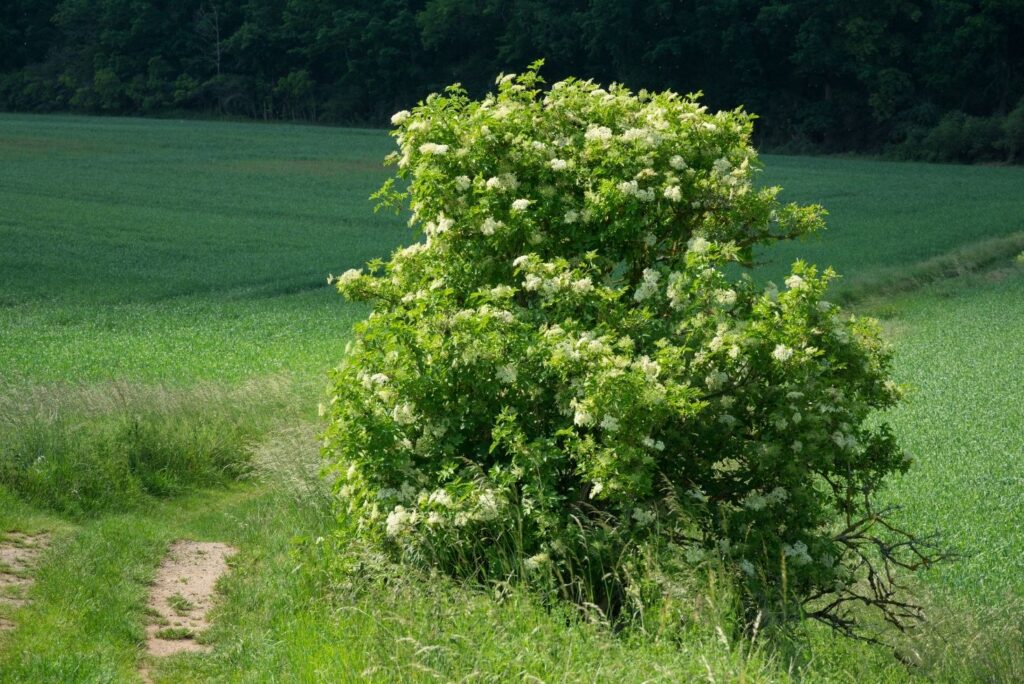
Hence the tradition that women who wanted children or were already pregnant should shake an elder bush so that a child’s soul would fall into their lap. No wonder the elder branches were used to make magic wands.
Countless myths and legends exist about the elder from the Middle East to northern Europe and Africa where it grows. These ancient myths are backed more and more by scientific research, which highlights the amazing medicinal properties of the elder.
Elder is said to have the quality of washing away all negative thoughts and feelings, by cleansing and purifying the soul. The famous elderflower cordial, prepared by fermenting elderflowers in honey water, is not only an aperitif drink and digestive tonic but also a ritual liqueur, which, can alleviate a lot of dis-ease. At least on a physical level, this alchemic, magical medicine has an exact counterpart. Elderflowers actually wash the body of toxins through their diuretic, diaphoretic and purifying effects, this being one of the key health benefits of elderflowers.
Read Also: 10 Health Benefits of Black Locust Flowers and How to Use
Now that you know the most important health benefits of elderflowers, let others find this out by sharing this article on social media. Thank you for being here and for taking the time to read our work. Stay healthy and happy, naturally!
Share on Pinterest ❤️

